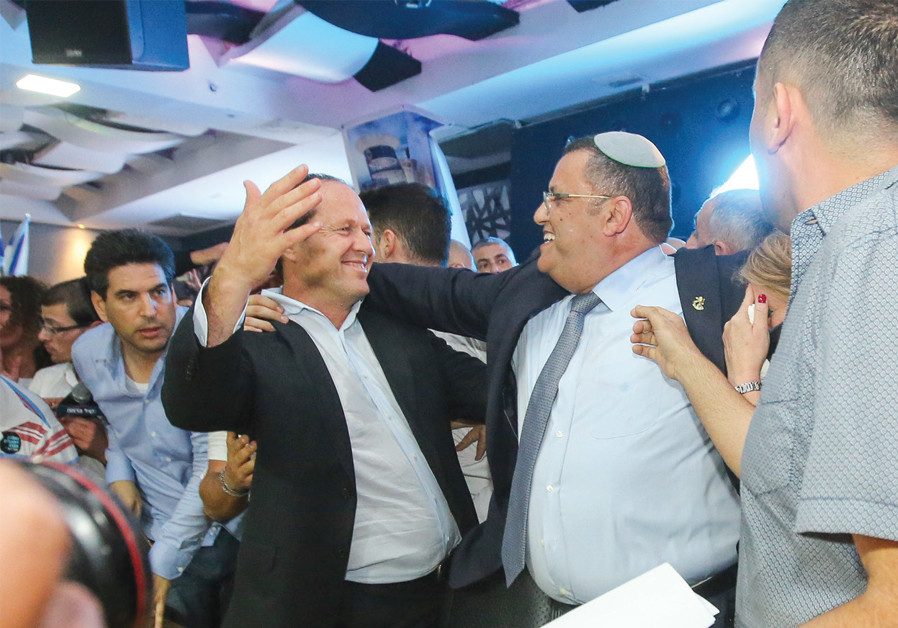As the year draws to a close, we review the stories that dominated the Holy City’s headlines.

1. Jerusalem elections
This year was consumed with the mayoral election as Nir Barkat stepped down from his longtime post. In a hot race, Moshe Lion beat out Ofer Berkovitch in a neck-and-neck run-off election on November 14. (Berkovitch’s Hitorerut faction garnered the largest bloc of city council seats, however, with seven.) The race was significant for unveiling the rift in Jerusalem’s haredi community, as parties that normally would have pledged allegiance to each other’s candidates were instead at odds against each other.
2. Trump cuts UNRWA funding
The Trump administration froze $25 million in funding to hospitals in east Jerusalem as part of its punitive campaign against the Palestinian Authority for refusing to participate in its peace effort.
This came after US President Donald Trump halted funding to the UN Relief and Works Agency in August, cut $200m. in aid to Gaza and the West Bank and warned of a complete end to all funding of Palestinian causes unless the PA enters meaningful negotiations with Israel. No doubt the trickle-down effect will continue to be felt at Jerusalem nonprofits also benefiting from US aid.
3. Measles outbreak
The first death from measles in 2018 was an 18-month-old who died on November 1 in Jerusalem.
The toddler’s death was the first recorded death from measles in Israel in 15 years. Many neighborhoods in the city and the surrounding area, such as Beit Shemesh, were under high surveillance for further outbreaks. The Health Ministry noted that as of late December, there were 2,690 patients with measles, with the peak of cases in October with 948 patients.
4. US Embassy opens in Jerusalem
Sixty-nine years after Israel declared Jerusalem as its capital, and 23 years after the US Congress passed a law mandating that Washington move its embassy there, the US formally opened its embassy in the city in May, in a move that Prime Minister Benjamin Netanyahu called “courageous” and “momentous.”
5. Netta wins Eurovision
Israel’s Netta Barzilai won the Eurovision Song Contest in May, bringing the 2019 competition to the Jewish state. Netta was ranked in second place in the betting charts, but ultimately trounced the other competitors, taking 529 points overall, to Cyprus’s 436, in second place. After weighing between hosting the competition in Jerusalem or in Tel Aviv, the honor went to the latter. Netta’s song “Toy” became a radio favorite worldwide.
6. Local Egged bus system sputters
The city’s bus service became an exasperating subject this year, as covered in In Jerusalem. Buses came infrequently, and after people waited up to 45 minutes, they would find the buses so full that they could barely squeeze in. City council members spoke at length with IJ about the city’s system and how complicated it is, given its management under the Transportation Ministry.
This also coincided with a big change this year: beginning in March, bus drivers in Israel no longer load Rav-Kav travel cards. Passengers must now ensure that their cards are loaded before they board a bus, to save the driver having to deal with cash while driving. The ministry’s decision to abolish cash fares was first implemented in Jerusalem.
In some future good news: The capital’s buses are set to be revamped by 2020, with a Transportation Ministry tender for 810 new buses, 200 of them electric, put out in this past month.
7. Giro in Jerusalem
The 101st Giro d’Italia passed through Jerusalem in May, as 175 riders from 22 teams raced toward the finish line in Eilat. The bicycle race was a historic three days, during which cycling captured the Israeli public’s imagination. Since 2006, the Giro has commenced every other year with a high-profile “Big Start” outside of Italy. This year’s “Big Start” in Israel was the first time the Giro, the Tour de France or the Vuelta a España has been held outside Europe.
8. Church land tax
A set of bills has launched a battle between the state and church leaders, particularly in the capital. One such bill, proposed by Kulanu MK Rachel Azaria (who later put on a short-lived campaign for Jerusalem mayor), aimed to nationalize properties used for housing that were owned by the church and sold to private developers. It was set for a vote in November and again in December, but was postponed due to pressure from the church leaders. Azaria has said church leaders have misinterpreted the bill, which she said is intended to protect residents living in buildings built on church-leased lands. A bipartisan group of US lawmakers, including a top Democratic senator and seven congressmen, sent a letter last month to US Secretary of State Mike Pompeo protesting Israel’s advancement of the bill. In February, the crisis over the bill peaked with a three-day closure of the Church of the Holy Sepulchre.
9. #MeToo movement
Since 2017, many news articles rocked the US entertainment world. After producer Harvey Weinstein was accused of raping and assaulting dozens of women, the accusations against others poured in. This effect continued in Israel. Several women spoke out about abuse by Keshet Media president Alex Gilady, who then resigned from the company. In the next few weeks, radio hosts Natan Zahavi and Gabi Gazit were both accused of assault and harassment by multiple women. Zahavi denied the claims and went on a brief hiatus from his program on 103FM, whereas the 72-year-old Gazit did not return.
10. Railway opens from Ben-Gurion Airport to Jerusalem
The long-anticipated railway line from Ben-Gurion Airport to Jerusalem was finally put into service on September 19, but was fraught with issues from its inauguration and is not expected to be finally completed to connect Tel Aviv to Jerusalem until mid-2019. Originally due to open in 2008, Israel’s flagship infrastructure project has been plagued by repeated lengthy delays and soaring costs.
As reported by The Jerusalem Post
